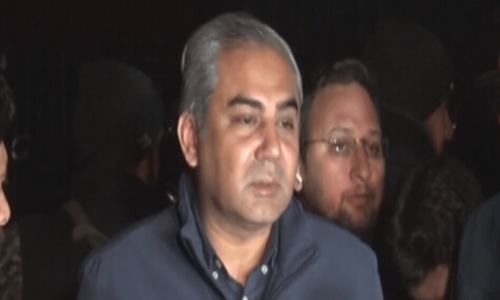ISLAMABAD: The Hazara community has asked the Supreme Court to appoint a judicial commission — similar to the one constituted in the wake of deadly twin bombings that targeted lawyers in Quetta — to identify the state elements responsible for perpetuating atrocities against the minority.
On Monday, Hazara Action Committee (HAC) chairman Liaquat Hazara appeared before a bench, headed by Justice Asif Saeed Khosa, which was following up on the critical Quetta Commission report, authored by Justice Qazi Faez Isa.
The court disposed of the main case and directed that the bench would pass an appropriate order in this regard.
Liaquat Hazara told the court his community was facing a virtual “genocide” in Balochistan and asked the court to allow them to become party to the case.
AG tells apex court govt working to choke terror financing networks
In his application, the HAC leader stated that more than half of the 600,000-strong Hazara tribes had fled the country because their businesses had been attacked and forced to close permanently.
“Our people have become mentally sick because they have been denied the right of movement and have been forced to live in a two-kilometre radius,” he said, referring to the Hazara Town area of Quetta.
At least 2,000 peace-loving and law-abiding citizens from the Hazara community have already lost their lives in different incidents of targeted killings and suicide bombings that have occurred over the last 18 years, the application maintains.
Mr Hazara alleged that professionals such as doctors, engineers, lawyers, businessmen, bureaucrats and students were massacred in broad daylight in premeditated sectarian attacks.
The application stated that the recent attack on Quetta Civil Hospital bore a striking resemblance to an earlier attack at the same location that targeted the Hazara community, adding that all attacks on Hazaras were claimed “by the same anti-state militant organisations and their protégé/splinter subordinate groups”.
Terror financing
During proceedings, Attorney General Ashtar Ausaf told the Supreme Court that the federal government was going beyond the recommendations of the Justice Qazi Faez Isa inquiry commission and was working on a mechanism to trace the financial links of terrorist outfits.
The government has already allocated budget and human resources for countering all forms of terrorism, in addition to measures such as safe city surveillance projects, satellite systems and geo-fencing, he said.
The court also assured the AG that they would consider his request to expunge the report’s observations about former interior minister Chaudhry Nisar Ali Khan, specifically the lines regretting his Oct 21, 2016 Punjab House meeting with Ahmed Ludhianvi, the head of the banned Sipah-i-Sahaba Pakistan, Millat-i-Islamia and Ahle Sunnat Wal Jamaat.
Mr Ausaf also assured the apex court that the National Counterterrorism Authority (Nacta), which was connected with all provinces, would implement the recommendations of the commission and would complete work on a centralised database of terrorists over the next 18 months.
This will enable the police of Balochistan and Khyber Pakhtunkhwa to identify or trace culprits through the centralised sharing of fingerprints, in addition to monitoring border movement. He said the government was also working to ensure strict monitoring of different madressahs around the country, as well as developing provisions to provide educational alternatives at close proximity to religious seminaries.
Published in Dawn, January 9th, 2018












































